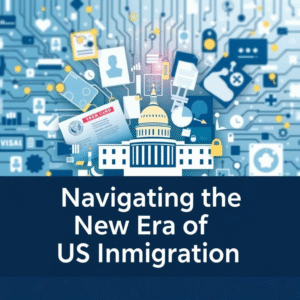The landscape of US immigration is in constant flux, but 2025 has ushered in a period of particularly significant change. From updated vetting standards to new rules impacting dependent children and even proposals to reform the entire H-1B visa and green card system, these developments are reshaping the path for millions of immigrants, students, and workers. The changes, driven by a renewed focus on national security and a shift toward what the administration calls a “merit-driven” system, introduce new complexities and challenges. For anyone navigating this system—whether you’re an international student, a skilled worker, or a family member of a US citizen—understanding these policy shifts is no longer optional; it is essential for protecting your legal status and future.
This article provides a detailed, informative, and engaging overview of the key 2025 US immigration policy changes, explaining their implications and offering a clear guide to help you stay ahead. We will delve into new ideological screening, the revised “good moral character” standard, and the critical adjustments to the Child Status Protection Act (CSPA) that are causing widespread concern among families. Our goal is to equip you with the knowledge needed to navigate this new era of immigration with confidence and clarity.
Table of Contents
The Ideological Shift: Vetting for “Anti-Americanism”
One of the most profound and controversial changes in 2025 is the expansion of immigration screening to include what US Citizenship and Immigration Services (USCIS) describes as “anti-American” or antisemitic views. This new policy, announced in August, directs immigration officers to evaluate whether applicants have “endorsed, promoted, supported, or otherwise espoused” such ideologies. While the stated goal is to protect national security, critics argue that the vague and subjective nature of the term “anti-Americanism” could lead to inconsistent and biased adjudications.
- Expanded Social Media Vetting: The new guidance builds upon existing policies by mandating a complete scouring of social media platforms and other public records. Officers are now specifically instructed to look for any commentary that could be interpreted as hostile toward US policy, institutions, or society.
- Broad Discretion for Officers: Without a clear definition of what constitutes an “anti-American” view, the policy grants significant discretion to individual officers. This lack of clear standards creates uncertainty for applicants, as a post or comment that seems innocuous could be misinterpreted and lead to a denial.
- Impact on Applicants: This ideological vetting applies to a wide range of immigration benefits, including green cards, work visas (like the H-1B visa), and naturalization. Legal experts are advising foreign nationals to exercise extreme caution in their public and private communications, as a single social media post could jeopardize a years-long immigration process.
This change represents a major departure from past practices, moving beyond criminal history and security risks to scrutinize personal beliefs and political opinions. For many, it raises serious questions about the balance between national security and the principles of free speech.
Redefining “Good Moral Character”
Concurrent with the new ideological screening, USCIS has updated its policy on what constitutes “good moral character” (GMC), a mandatory requirement for naturalization and many other immigration benefits. The revised guidance calls for a more “holistic” review that scrutinizes applicants’ behavior more closely while also allowing them to present positive contributions.
The updated policy framework places a greater emphasis on:
- Disqualifying Behaviors: While permanent bars like murder and aggravated felonies remain, the new policy gives officers more latitude to consider a broader range of “unlawful or contrary” acts. This could include habitual traffic infractions, reckless behavior, or even aggressive solicitation—actions that, while not typically criminal, are deemed inconsistent with civic responsibility.
- Positive Contributions: For the first time, the policy explicitly encourages officers to weigh positive factors. These may include a record of community involvement, family caregiving, educational attainment, a stable employment history, and compliance with tax obligations.
- Increased Scrutiny: Applicants are likely to face more detailed questioning during their interviews regarding their life and conduct. This shift means that even seemingly minor past incidents could be subject to intense scrutiny, making thorough preparation of an application more critical than ever.
The new GMC policy reflects a broader effort to ensure that US citizenship is granted only to those who demonstrate a high standard of conduct and a positive record of integration into society. For applicants, this means that a simple criminal background check is no longer sufficient; they must be ready to prove their value and upstanding character through their entire life history.
The Child Status Protection Act (CSPA) Rollback: A New Crisis for Families
Perhaps the most impactful policy change for many immigrant families in 2025 is the revision to the Child Status Protection Act (CSPA) age calculation. The CSPA was enacted by Congress to prevent a child from “aging out”—turning 21 and losing eligibility for a green card—due to government processing delays.
In a significant policy reversal, USCIS has announced that it will revert to an older, less generous method for calculating a child’s age.
- The Change: Previously, under a February 2023 policy, a child’s age was “locked” (frozen for eligibility purposes) when their priority date became current on the Dates for Filing chart of the Visa Bulletin. The new policy, effective August 15, 2025, dictates that the age will now only be locked when the priority date is current on the Final Action Dates chart.
- The Critical Difference: The Final Action Dates chart often lags years behind the Dates for Filing chart, especially for oversubscribed categories like the employment-based green card backlog for nationals of India. This change means that many children who were previously protected by the more generous rule will now turn 21 before their visa number is available, forcing them to “age out” of their family’s petition.
- Impact on H-4 Children: This policy disproportionately affects children of H-1B visa holders, many of whom have grown up and been educated in the United States. If they age out, they lose their H-4 dependent status and must secure their own visa, such as an F-1 student visa or H-1B visa, to remain in the country. This can disrupt their education, make them ineligible for certain scholarships, and separate them from their families.
The rollback has created a wave of panic and uncertainty for thousands of families who have been waiting for years for their green cards. For many, it represents a heartbreaking setback that could derail their dreams of building a permanent life in the US.
Looking Ahead: Potential H-1B and Green Card Reform
Beyond the immediate policy changes, there are ongoing discussions about a more fundamental overhaul of the US immigration system. A key proposal being discussed within the administration is a shift away from the current lottery-based system for H-1B visas and a move toward a wage-based allocation.
- The “Gold Card” Proposal: The administration has also floated the idea of a “Gold Card” that would serve as a new pathway to a green card for highly skilled, high-earning individuals, bypassing the traditional lottery system. This aligns with a broader goal of attracting what the administration considers “the best people.”
- Focus on High-Skilled Workers: The proposals signal a move toward a more merit-based system, which could benefit those with exceptional qualifications and high salaries. However, critics argue that this could make it more difficult for new graduates, researchers, and professionals in lower-paying but critical fields to gain a foothold in the country.
While these are still proposals, they reflect a clear direction in policy—one that favors skill and earning potential over the traditional lottery system. The outcome of these discussions will have a lasting impact on the future of work in the United States and the global talent pool.
Summary of Key Changes
- Ideological Vetting: USCIS officers can now screen applicants for “anti-American” or antisemitic views, introducing a new layer of subjective scrutiny.
- Good Moral Character: The standard for GMC has been broadened to a “holistic” review that considers a wider range of behaviors, both positive and negative.
- CSPA Rollback: The method for calculating a dependent child’s age has changed, requiring a current Final Action Date to lock the age, which puts many children at risk of aging out.
- Potential Reforms: The administration is exploring major overhauls, including a wage-based system for H-1B visas and a new “Gold Card” for high-skilled workers.
These 2025 US immigration policy changes represent a significant shift in the approach to immigration. For anyone affected, staying informed, seeking professional legal advice, and preparing for increased scrutiny are the best ways to navigate this new and complex environment.
FAQ Section
Q1: How can I find my priority date and track my case? A: You can find your priority date on the Form I-797C, Notice of Action, that was sent to your petitioner. To track your case, you can use the official USCIS Case Status Online tool. Simply enter your receipt number from the Form I-797C.
Q2: Will the new “anti-Americanism” policy affect my existing application? A: Yes, the policy is being applied to all pending and new applications that require an officer’s discretion. It is a good idea to review your social media history and be prepared to answer questions about any public statements or affiliations.
Q3: What alternatives are there for children who “age out” of their family’s green card petition? A: If a child ages out, they lose their eligibility as a dependent. They must seek an alternative nonimmigrant status like an F-1 student visa or find a sponsoring employer to file a separate H-1B visa petition for them. Families can also explore the EB-5 Immigrant Investor Program as another option.
Q4: Is the H-1B visa lottery system officially changed? A: No, the lottery system has not been officially changed as of now. The proposals for a wage-based system are still under consideration and would likely require a formal rulemaking process or congressional action to be implemented.
Q5: Where can I find the official Visa Bulletin? A: The Visa Bulletin is published monthly by the Department of State. You can access the most recent version on their official website.
Conclusion
The 2025 US immigration policy changes have introduced new layers of complexity and scrutiny for individuals and families seeking to live and work in the United States. From ideological vetting and a redefined standard for good moral character to the critical rollback of Child Status Protection Act benefits, these developments underscore a period of significant shifts. Staying informed through official sources like USCIS, the Department of State, and reputable news outlets is paramount. While the future of some of these policies remains uncertain, adapting to the current environment with diligence and professional guidance is the most effective way to navigate the path ahead.
Disclaimer
This article is intended for informational purposes only and does not constitute legal advice. Immigration law is highly complex and subject to change. Readers should consult with a qualified immigration attorney or an accredited representative for advice on their specific situation. The information provided here is based on publicly available news and official government sources as of August 2025.
Affiliate Disclosure
This article does not contain any affiliate links.







